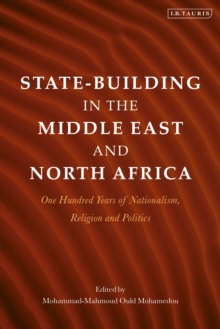Description
| Product ID: | 9780755601400 |
| Product Form: | Paperback / softback |
| Country of Manufacture: | GB |
| Title: | State-Building in the Middle East and North Africa |
| Subtitle: | One Hundred Years of Nationalism, Religion and Politics |
| Authors: | Author: Mohammad-Mahmoud Ould Mohamedou |
| Page Count: | 296 |
| Subjects: | Middle Eastern history, Middle Eastern history, National liberation and independence, Nationalism, Diplomacy, National liberation & independence, post-colonialism, Nationalism, Diplomacy, Middle East, North Africa |
| Description: | Why have state-building projects across the MENA region proven to be so difficult for so long? Following the end of the Ottoman Empire in the early 1920s, the countries of the region began a violent and divisive process of state formation. But a century later, state-building remains inconclusive. This book traces the emergence and evolution of state-building across the MENA region and identifies the main factors that impeded its success: the slow end of the Ottoman Empire; the experience of colonialism; and the rise of nationalistic and religious movements. The authors reveal the ways in which the post-colonial state proved itself authoritarian and formed on the model of the colonial state. They also identify the nationalist and Islamist movements that competed for political leadership across the nascent systems, enabling the military to establish a grip on the security apparatus and national economies. Finally, in the context of the Arab Spring and its conflict-filled aftermath, this book shows how external powers reasserted their interventionism. In outlining the reasons why regional states remained hollow and devoid of legitimacy, each of the contributors shows that recent conflicts and crises are deeply connected to the foundational period of one century ago. Edited by Mohammad-Mahmoud Ould Mohamedou, the volume features contributions by stellar scholars including Faleh Abdel Jabar, Lisa Anderson, Bertrand Badie, François Burgat, Benoit Challand, Ahmad Khalidi, Henry Laurens, Bruce Rutherford, Jordi Tejel and Ghassan Salamé. Why have state-building projects across the MENA region proven to be so difficult for so long? Following the end of the Ottoman Empire in the early 1920s, the countries of the region began a violent and divisive process of state formation. But a century later, state-building remains inconclusive. This book traces the emergence and evolution of state-building across the MENA region and identifies the main factors that impeded its success: the slow end of the Ottoman Empire; the experience of colonialism; and the rise of nationalistic and religious movements. The authors reveal the ways in which the post-colonial state proved itself authoritarian and formed on the model of the colonial state. They also identify the nationalist and Islamist movements that competed for political leadership across the nascent systems, enabling the military to establish a grip on the security apparatus and national economies. Finally, in the context of the Arab Spring and its conflict-filled aftermath, this book shows how external powers reasserted their interventionism. In outlining the reasons why regional states remained hollow and devoid of legitimacy, each of the contributors shows that recent conflicts and crises are deeply connected to the foundational period of one century ago. Edited by Mohammad-Mahmoud Ould Mohamedou, the volume features contributions by stellar scholars including Faleh Abdel Jabar, Lisa Anderson, Bertrand Badie, François Burgat, Benoit Challand, Ahmad Khalidi, Henry Laurens, Bruce Rutherford, Jordi Tejel and Ghassan Salamé. |
| Imprint Name: | I.B. Tauris |
| Publisher Name: | Bloomsbury Publishing PLC |
| Country of Publication: | GB |
| Publishing Date: | 2021-11-18 |


